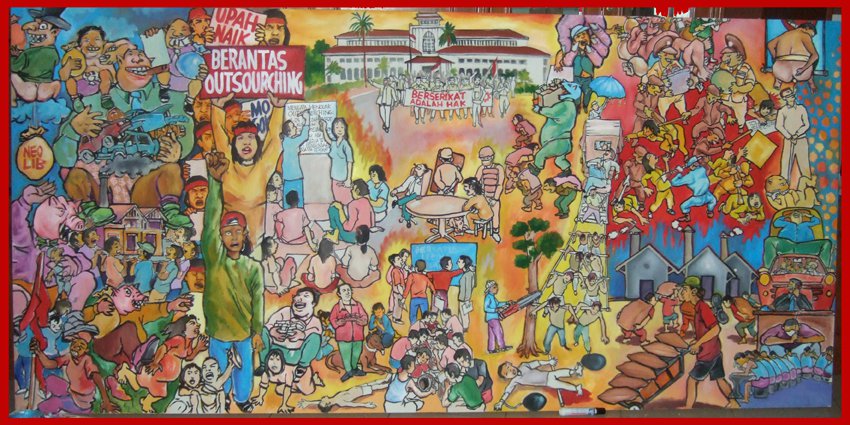Faisal Maliki Baskoro | January 30, 2012
The mix of workers emboldened by recent labor victories and a fear of higher costs from the state’s plan to limit subsidized fuel consumption could spark more radical demonstrations in the future, union leaders say.
Timbul Siregar, chairman of the Indonesian Workers Association (OPSI), said on Sunday that workers were beginning to realize that radical organized protests were the key to accomplishing their objectives.
“Protesting in front of the mayor’s office or the State Palace is a thing of the past,” he said. “Workers have learned that the way to be heard is to shut down the country’s economic vein.”
Timbul was referring to the labor protest in Bekasi on Friday that saw thousands of workers from about 300 companies block the Jakarta-Cikampek toll road for several hours, paralyzing economic activity in the area.
Following marathon meetings on Friday night and Saturday morning, they secured a new minimum wage deal: Rp 1.491 million ($167) for Group I, Rp 1.715 million for Group II and Rp 1.849 million for Group III workers.
The new wage rates were each lowered by just less than Rp 1,000 from the rates in the original gubernatorial decree, which had been contested by the Indonesian Employers Association (Apindo).
The Bekasi victory comes in the wake of similar triumphs. Freeport Indonesia’s 8,000 workers last year went on a months-long strike that crippled the lucrative mine’s operations and received a 37 percent pay raise.
Budi Wardoyo, a spokesman for labor movement the People’s Liberation Party, said the government’s plan to limit subsidized fuel consumption would have an adverse affect on workers’ welfare and hence provide more reason to fight for better welfare.
“They will demand better wages and benefits to compensate for rising costs caused by the government’s subsidy plan,” said Budi, also a former secretary general at the Indonesian Labor Movement Association (PPBI).
He added that future labor demonstrations would not be the typical pockets of protests in front of government offices.
“Workers’ protests could strike simultaneously in different regions,” Budi said.
“We may even close down the Indonesia Stock Exchange to prove a point,” Timbul said.
Timbul said that although there were countless labor unions representing the 115 million-strong Indonesian workforce, those unions were becoming more organized and united.
“Our point is that workers are very marginalized,” he said. “If there is economic turbulence, workers will get fired first.
“We are fed up with being treated like objects.”
According to data from the Ministry of Manpower and Transmigration, most provincial minimum wage levels are still set below the decent cost of living standard (KHL) established by provincial wage councils.
In Banten, where companies such as Krakatau Steel and Chandra Asri Petrochemical are located, the 2012 minimum wage is Rp 1.042 million, below the KHL of Rp 1.08 million.
“Labor costs are only 10 to 15 percent of the price component,” Timbul said. “Workers deserve a raise, especially now that Indonesia is at investment grade.”
Employers, he said, could offset rising labor costs by ramping up production. But to do that, he added, the government would need to support industries by ensuring a stable supply of energy and removing “illegal fees.”
“Logistic costs are high,” he said. “Red tape also adds to production costs. And at the bottom of the price chain is the workers.
“Employers reduce workers’ salaries and sometimes even lay off people just to compensate for high economic costs.”



No comments:
Post a Comment